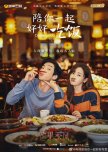Cette critique peut contenir des spoilers
Five Ingredients to Dine with Love
What ingredients make a foodie romance drama endearing?
Happy ending? Great chemistry between the leads? Food?
Dine with Love has those three plus two extra ingredients – a tight script and just the right amount of silly supporting characters. These five ingredients, I find, make this drama enjoyable:
1. Fabulous main couple and the actors who played them.
Gao Han Yu and Jade Cheng, breathe life into Yu Hao and Su Ke Lan, respectively. Him, the cold CEO and her, the warm PR manager. Together, they displayed a comfortable long-term couple vibe. And I was very drawn to their chemistry. Oh. I have lost count of the number of times he was shirtless!
It is worth noting that Yu Hao and Su Ke Lan are one of the most mature yet flawed characters in Chinese romance drama. Individually, each carries trauma and heavy responsibilities. It shaped them into who they are and how they handle relationships as a couple and with others.
2. Tight script
In a 16 episodes format, the writers did not stray away from themes of food, family, friendship, and forgiveness. It is also tightly focused on the main couple. All subplots are connected to Yu Hao and Su Ke Lan - illness, ex-partners, business dealings, and secondary couple’s stories.
3. Main supporting Characters
The drama contains just the right amount of silly supporting characters. They served as support and competition to the main couple and slight comedic relief. My favourite amongst them is Yu Hao’s uncle, as he is the only one that brings out Yu Hao’s childishness.
4. Food
Specifically, cooking lessons. During these lessons, Su Ke Lan shined! I want her to be my cooking teacher. She is calm, always smiling and imparts knowledge about the value of food and cooking. She also gives an egg coated fried rice recipe! Yes, I did try it, and it was yummy.
In these lessons, the couple gets to know each other. It was calm yet intimate. And Yu Hao was mesmerised and addicted to her and her food. There was a scene when he turned on his laptop camera just to see her cooking behind him. Sneaky!
5. Happy ending
It is one of the most important ingredients to any romance fan. A good happy ending requires the audience to go through anticipation, warm fuzziness, heartbreak, frustration, and finally happiness. Dine with Love did not disappoint. My heart was full when they kissed in the final scene and burst when I saw the short bonus episode. Tip – find that extra episode! You will be giddy.
These five ingredients make this drama endearing and lovable to me from episode one right through the finale. It is still a flawed production (and what story isn’t?) but it showed me how invested I was in both Yu Hao and Su Ke Lan. I would have loved to spend more time with them as a couple before the proposal and less time during their separation.
On a final note – the now infamous ‘Sewing Scene’ of episode 12, is the most sensual in a Chinese romance drama I have ever watched. You are most welcome.
With love,
Lady Ajumma.
Ps. Despite the poor subbing during airing, it does not deter away from the quality of the story.
Happy ending? Great chemistry between the leads? Food?
Dine with Love has those three plus two extra ingredients – a tight script and just the right amount of silly supporting characters. These five ingredients, I find, make this drama enjoyable:
1. Fabulous main couple and the actors who played them.
Gao Han Yu and Jade Cheng, breathe life into Yu Hao and Su Ke Lan, respectively. Him, the cold CEO and her, the warm PR manager. Together, they displayed a comfortable long-term couple vibe. And I was very drawn to their chemistry. Oh. I have lost count of the number of times he was shirtless!
It is worth noting that Yu Hao and Su Ke Lan are one of the most mature yet flawed characters in Chinese romance drama. Individually, each carries trauma and heavy responsibilities. It shaped them into who they are and how they handle relationships as a couple and with others.
2. Tight script
In a 16 episodes format, the writers did not stray away from themes of food, family, friendship, and forgiveness. It is also tightly focused on the main couple. All subplots are connected to Yu Hao and Su Ke Lan - illness, ex-partners, business dealings, and secondary couple’s stories.
3. Main supporting Characters
The drama contains just the right amount of silly supporting characters. They served as support and competition to the main couple and slight comedic relief. My favourite amongst them is Yu Hao’s uncle, as he is the only one that brings out Yu Hao’s childishness.
4. Food
Specifically, cooking lessons. During these lessons, Su Ke Lan shined! I want her to be my cooking teacher. She is calm, always smiling and imparts knowledge about the value of food and cooking. She also gives an egg coated fried rice recipe! Yes, I did try it, and it was yummy.
In these lessons, the couple gets to know each other. It was calm yet intimate. And Yu Hao was mesmerised and addicted to her and her food. There was a scene when he turned on his laptop camera just to see her cooking behind him. Sneaky!
5. Happy ending
It is one of the most important ingredients to any romance fan. A good happy ending requires the audience to go through anticipation, warm fuzziness, heartbreak, frustration, and finally happiness. Dine with Love did not disappoint. My heart was full when they kissed in the final scene and burst when I saw the short bonus episode. Tip – find that extra episode! You will be giddy.
These five ingredients make this drama endearing and lovable to me from episode one right through the finale. It is still a flawed production (and what story isn’t?) but it showed me how invested I was in both Yu Hao and Su Ke Lan. I would have loved to spend more time with them as a couple before the proposal and less time during their separation.
On a final note – the now infamous ‘Sewing Scene’ of episode 12, is the most sensual in a Chinese romance drama I have ever watched. You are most welcome.
With love,
Lady Ajumma.
Ps. Despite the poor subbing during airing, it does not deter away from the quality of the story.
Cet avis était-il utile?


 3
3 7
7























